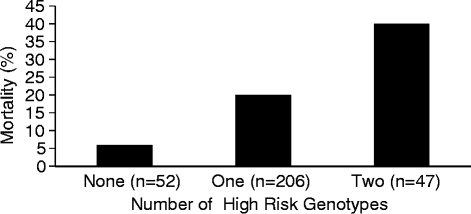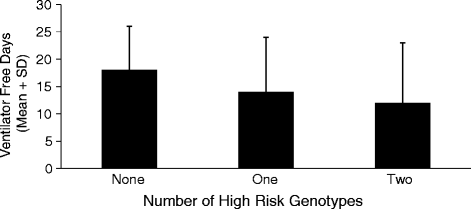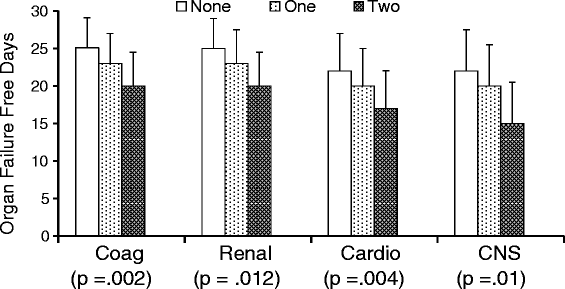Association of common genetic variation in the protein C pathway genes with clinical outcomes in acute respiratory distress syndrome
- PMID: 27215212
- PMCID: PMC4876559
- DOI: 10.1186/s13054-016-1330-5
Association of common genetic variation in the protein C pathway genes with clinical outcomes in acute respiratory distress syndrome
Abstract
Background: Altered plasma levels of protein C, thrombomodulin, and the endothelial protein C receptor are associated with poor clinical outcomes in patients with acute respiratory distress syndrome (ARDS). We hypothesized that common variants in these genes would be associated with mortality as well as ventilator-free and organ failure-free days in patients with ARDS.
Methods: We genotyped linkage disequilibrium-based tag single-nucleotide polymorphisms in the ProteinC, Thrombomodulin and Endothelial Protein C Reptor Genes among 320 self-identified white patients of European ancestry from the ARDS Network Fluid and Catheter Treatment Trial. We then tested their association with mortality as well as ventilator-free and organ-failure free days.
Results: The GG genotype of rs1042580 (p = 0.02) and CC genotype of rs3716123 (p = 0.002), both in the thrombomodulin gene, and GC/CC genotypes of rs9574 (p = 0.04) in the endothelial protein C receptor gene were independently associated with increased mortality. An additive effect on mortality (p < 0.001), ventilator-free days (p = 0.01), and organ failure-free days was observed with combinations of these high-risk genotypes. This association was independent of age, severity of illness, presence or absence of sepsis, and treatment allocation.
Conclusions: Genetic variants in thrombomodulin and endothelial protein C receptor genes are additively associated with mortality in ARDS. These findings suggest that genetic differences may be at least partially responsible for the observed associations between dysregulated coagulation and poor outcomes in ARDS.
Figures



Comment in
-
Genomics and pharmacogenomics of sepsis: so close and yet so far.Crit Care. 2016 Jul 7;20(1):185. doi: 10.1186/s13054-016-1374-6. Crit Care. 2016. PMID: 27384443 Free PMC article.
Similar articles
-
Plasma soluble thrombomodulin levels are associated with mortality in the acute respiratory distress syndrome.Intensive Care Med. 2015 Mar;41(3):470-8. doi: 10.1007/s00134-015-3648-x. Epub 2015 Feb 3. Intensive Care Med. 2015. PMID: 25643902 Free PMC article.
-
Genome-Wide Association Study in African Americans with Acute Respiratory Distress Syndrome Identifies the Selectin P Ligand Gene as a Risk Factor.Am J Respir Crit Care Med. 2018 Jun 1;197(11):1421-1432. doi: 10.1164/rccm.201705-0961OC. Am J Respir Crit Care Med. 2018. PMID: 29425463 Free PMC article.
-
Protein C and thrombomodulin in human acute lung injury.Am J Physiol Lung Cell Mol Physiol. 2003 Sep;285(3):L514-21. doi: 10.1152/ajplung.00442.2002. Epub 2003 May 16. Am J Physiol Lung Cell Mol Physiol. 2003. PMID: 12754194
-
Acute lung injury and the coagulation pathway: Potential role of gene polymorphisms in the protein C and fibrinolytic pathways.Intensive Care Med. 2006 Sep;32(9):1293-303. doi: 10.1007/s00134-006-0223-5. Epub 2006 Jun 13. Intensive Care Med. 2006. PMID: 16770611 Review.
-
Emerging role of anticoagulants and fibrinolytics in the treatment of acute respiratory distress syndrome.Pharmacotherapy. 2007 Jun;27(6):860-73. doi: 10.1592/phco.27.6.860. Pharmacotherapy. 2007. PMID: 17542769 Free PMC article. Review.
Cited by
-
Genomics and pharmacogenomics of sepsis: so close and yet so far.Crit Care. 2016 Jul 7;20(1):185. doi: 10.1186/s13054-016-1374-6. Crit Care. 2016. PMID: 27384443 Free PMC article.
-
Genetic justification of severe COVID-19 using a rigorous algorithm.Clin Immunol. 2021 May;226:108726. doi: 10.1016/j.clim.2021.108726. Epub 2021 Apr 13. Clin Immunol. 2021. PMID: 33845193 Free PMC article.
-
TM9SF1 offers utility as an efficient predictor of clinical severity and mortality among acute respiratory distress syndrome patients.Front Immunol. 2024 Jun 3;15:1408406. doi: 10.3389/fimmu.2024.1408406. eCollection 2024. Front Immunol. 2024. PMID: 38887291 Free PMC article.
-
The Current State of Pediatric Acute Respiratory Distress Syndrome.Pediatr Allergy Immunol Pulmonol. 2019 Jun 1;32(2):35-44. doi: 10.1089/ped.2019.0999. Epub 2019 Jun 17. Pediatr Allergy Immunol Pulmonol. 2019. PMID: 31236307 Free PMC article. Review.
-
Dysregulated Coagulation and Fibrinolysis Are Present in Patients Admitted to the Emergency Department with Acute Hypoxemic Respiratory Failure: A Prospective Study.Biomedicines. 2024 May 13;12(5):1081. doi: 10.3390/biomedicines12051081. Biomedicines. 2024. PMID: 38791043 Free PMC article.
References
Publication types
MeSH terms
Substances
Grants and funding
- HL103836/HL/NHLBI NIH HHS/United States
- HL51856/HL/NHLBI NIH HHS/United States
- N01-HR-16146-54/HR/NHLBI NIH HHS/United States
- N01 HR016146/HR/NHLBI NIH HHS/United States
- HL110969/HL/NHLBI NIH HHS/United States
- R01 HL131621/HL/NHLBI NIH HHS/United States
- K24 HL103836/HL/NHLBI NIH HHS/United States
- HD047349/HD/NICHD NIH HHS/United States
- R37 HL051856/HL/NHLBI NIH HHS/United States
- N01-HR-46046-64/HR/NHLBI NIH HHS/United States
- K12 HD047349/HD/NICHD NIH HHS/United States
- HL112656/HL/NHLBI NIH HHS/United States
- R21 HL112656/HL/NHLBI NIH HHS/United States
- U01 HL081332/HL/NHLBI NIH HHS/United States
- R01 HL110969/HL/NHLBI NIH HHS/United States
- K23 HL085526/HL/NHLBI NIH HHS/United States
- KL2 RR024130/RR/NCRR NIH HHS/United States
- HL131621/HL/NHLBI NIH HHS/United States
- R01 HL051856/HL/NHLBI NIH HHS/United States
LinkOut - more resources
Full Text Sources
Other Literature Sources
Miscellaneous

